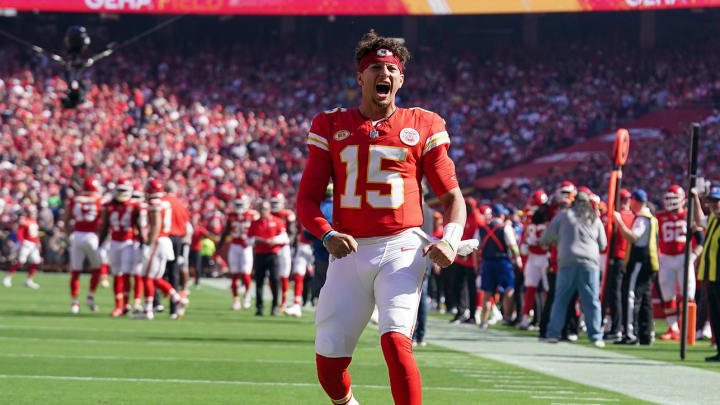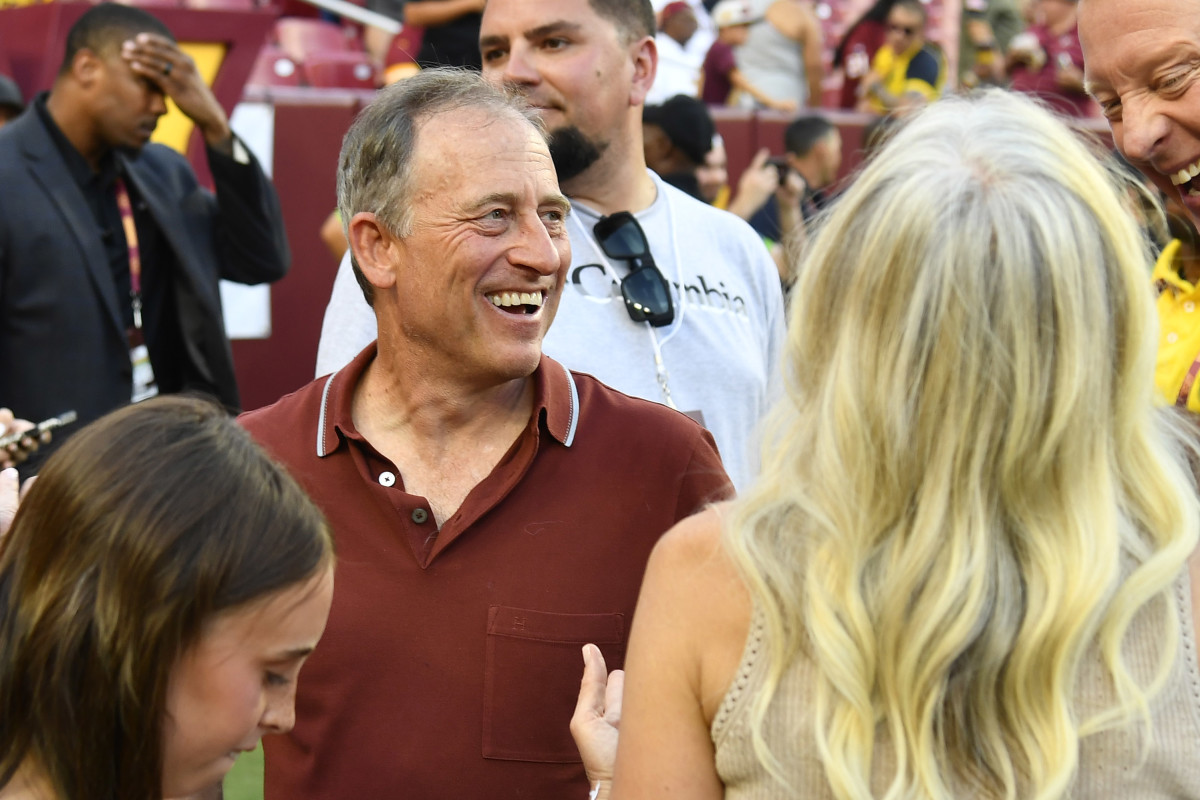Examining Patrick Mahomes’s Contract Restructure and a New NFL Ownership Committee

First, a note about that apparent “thing” between Travis Kelce and Taylor Swift.
As if either entity needed more publicity, cachet or business boosts, Kelce, Swift and the NFL itself all just got it.
This pairing has drawn news and entertainment programming that rarely, if ever, ventures into the sports realm. Kelce—and by proxy, the Chiefs and the NFL—is gaining hundreds of thousands (millions?) of new fans who didn’t know him before. I have friends and family who are not NFL fans, including my mother, asking me about Kelce now. This has transcended sports.
Not only does the NFL have new fans it didn’t really need, so does Swift. Of course, she already has captured virtually every demographic, but perhaps not hardcore NFL fans. Now, whether they listen to her music or not, they are paying attention.
This is such a business windfall for all sides that it kind of makes me wonder whether it is actually real. For now, though, I’ll give them the benefit of the doubt that “Swelce” is genuine.
On to more business about the Chiefs …

Mahomes’s inequity only partially addressed
I have long discussed the fact that since the ink was barely dry on Patrick Mahomes’s contract extension with the Chiefs in 2020, the marketplace passed it by. Now three years removed, the Chiefs have finally addressed the contract’s lopsidedness with a restructured deal. It is a nice gesture, but it still leaves the contract wanting.
There are three segments of this contract. One was upgraded; the other two were not. Let’s examine.
Segment one: 2020 to ’22
During these first three years of the original extension, Mahomes made $63 million. For comparison’s sake, here are some other three-year cash totals for quarterbacks that were negotiated soon after Mahomes’s extension.
• Josh Allen ($95 million)
• Kyler Murray ($108 million)
• Russell Wilson ($126 million)
• Deshaun Watson ($138 million)
• Lamar Jackson ($156 million)
Heck, Jackson ($80 million in 2023), Wilson ($70 million in ’19) and Aaron Rodgers ($66.9 million in ’18) all had one-year compensation more than Mahomes made in three years!
There was no upgrade from the Chiefs, either, during those three years or as part of this augmented contract. Conservatively, Mahomes was underpaid by at least $15 million per year over the past three seasons.
Segment two: 2023 to ’26
Mahomes will now make $210 million over this four-year period, more than the $208 million that Jackson will earn over the same time frame, to make Mahomes—for the moment—the highest-paid player in this time frame. The Chiefs added roughly $44 million, roughly $11 million per year, bringing Mahomes in line with the current marketplace for segment two.
Kudos to the Chiefs for addressing the inequity of the contract here, if not other parts.
Mahomes will now make $275 million over the first seven years of his extension, an annual average of $39.3 million, still below peers such as Justin Herbert and Joe Burrow, who both just negotiated new contracts.
Segment three: 2027 to ’31
Following the upgrade above, there will still be five years remaining on the contract! The length was not adjusted. Once again, Mahomes will have to continue to play at an elite level and “trust the team” that this extraordinarily long contract—a length that only favors the Chiefs—will be upgraded.
The amount on the books for these years comes to $208.7 million, an average of $41.7 million which, by that time, will be miles below the average for top QBs. That is what was and what is still on the books for Mahomes after the contract upgrade.
I know what some of you are saying: “Andrew, Mahomes is happy and making a lot of money off the field, so why should you care?” I just try to be authentic and pull back the curtain on a contract that still has many fooled as thinking it’s the “biggest contract in NFL history” (simply because it is the longest contract in NFL history).
I’ve spent more than a decade on each side of the NFL player contract negotiating table and call it as I see it. Mahomes continues to be dramatically underpaid by the Chiefs.

Institutional ownership is coming
The NFL has now formed a committee of five owners—Arthur Blank (Falcons), Robert Kraft (Patriots), Jimmy Haslam (Browns), Greg Penner (Broncos) and Clark Hunt (Chiefs)—to examine the league’s ownership policies. They will look at debt levels, equity requirements and, most interestingly to me, eligible categories of investors.
The NFL ownership paradigm has always featured “one voice per club” with everyone knowing “the owner” representing that team. While that will not change, my sense is the wealth behind it will. These teams are now too expensive for the traditional model to stay the same.
The Commanders fetched a staggering $6.05 billion. That bested the Broncos’ record price of $4.65 billion in 2022, which more than doubled the sale before that, the Panthers at $2.275 billion in ’18. With this trajectory, financing is going to have to come from more than multibillionaires, as there are only so many of them. Thus, in my opinion, this committee will eventually relax rules on institutional money—private equity, hedge funds and, yes, sovereign wealth funds—supporting team ownership.
Corporate investment has happened in other sports, most notably the NBA, where institutional financing is allowed for up to 30% of team equity, with no more than 20% coming from a single firm. And sovereign wealth fund investment has already come to the NBA and NHL, as the Qatari Investment Authority now has a 5% stake in Monumental Sports, owners of the NBA’s Wizards and NHL’s Capitals.
And then, of course, there is the $700 billion Saudi Public Investment Fund (PIF), now financing the merger between the PGA Tour and LIV Golf. When that was announced in June, I said two things: (1) PIF “bought golf,” and (2) this would be an entry point into the “core four” American sports: NBA, NHL, MLB and, yes, NFL. It may not happen soon, but mark my words: It will happen.
No, PIF or the Qatari fund or even a PE firm are not going to be the “owner” of any NFL team in our lifetime. However, I do see allowance for corporate investment coming out of this committee’s recommendations: first private equity and then sovereign wealth funds.
Franchise prices are too steep for this not to happen.
Other notes
• The NFL’s filing of a grievance against the NFLPA over comments about running backs faking injuries to force new contracts is just rubbing players’ noses in the fact the teams hold all the cards with this position.
• I feel for Jets fans. Over the last five years, the team has used the third pick in the draft (Sam Darnold) and the second pick in the draft (Zach Wilson) to select quarterbacks. What the league and the teams sell during the draft is hope, and there is no greater source of hope than a quarterback drafted atop the first round. Both picks have failed, so much on the latter that the team traded two second-round picks (and swapped first-round picks) and committed $75 million to Aaron Rodgers to replace him. And now that Rodgers is injured, the team has to return to Wilson, still there due only to his lofty draft position. The team’s scouting department has failed those fans.
As I say (with my Packers bias): The best time to draft a quarterback is when you don’t need a quarterback.
